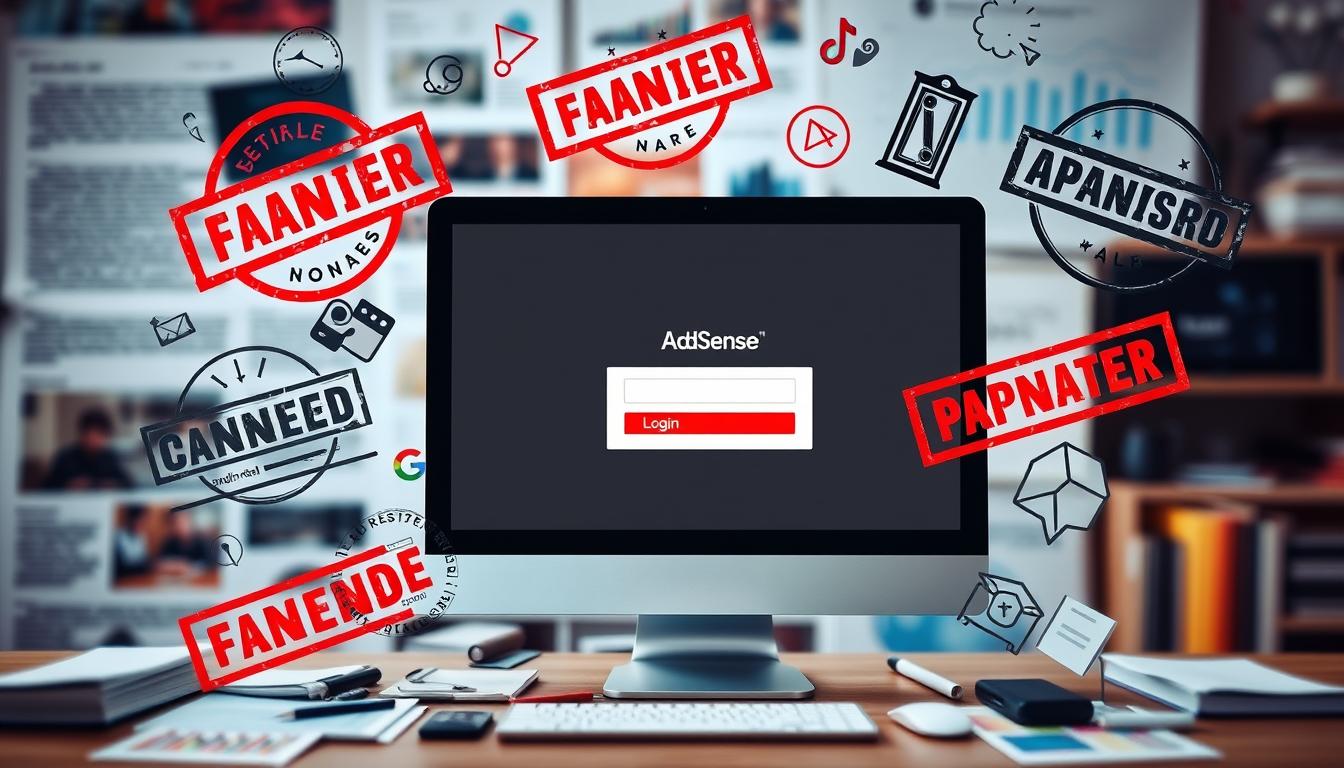Why Your Blog Isn’t Getting Google AdSense Approval
Many bloggers dream of making money from their blogs. But getting Google AdSense approval can be tough. Google AdSense has strict rules and a detailed review process. Knowing the policies, content standards, and technical needs can help you get approved.
In this article, we’ll explore why your blog might not get AdSense approval. We’ll also share tips to help you succeed in the application process.
Key Takeaways
- Familiarize yourself with Google Monetization Platform core policy guidelines and content quality benchmarks.
- Ensure your website meets the technical requirements set by Google AdSense.
- Identify and address any issues with the originality and quantity of content on your blog.
- Optimize your website’s navigation, user experience, and loading speed to meet AdSense standards.
- Diversify your traffic sources and ensure your content doesn’t violate any Monetization Platform policies.
Understanding Google Monetization Platform Requirements and Standards
To get your blog approved for Google Monetization Platform, knowing the platform’s rules is key. AdSense has detailed policies and guidelines. Bloggers must follow these to make sure their content and site meet the program’s needs.
Core Policy Guidelines
AdSense has strict policies for content and website quality. These rules cover original content, user privacy, and what content is off-limits. Bloggers need to know these policies well and make sure their site follows them.
Content Quality Benchmarks
Google values high-quality content when checking AdSense apps. Your blog should have consistent, unique, and engaging content. This means your content should be deep, well-written, and relevant to your readers.
Website Technical Requirements
AdSense also has tech standards for websites. These include site structure, mobile friendliness, and fast loading times. Meeting these tech requirements is crucial for AdSense approval and a good user experience.
| Requirement | Description |
|---|---|
| Site Structure | Your website should have a clear and intuitive navigation system, with well-organized content and pages. |
| Mobile Responsiveness | Your blog must be optimized for mobile devices, providing a seamless user experience on various screen sizes. |
| Loading Speed | Your website should load quickly, ensuring a smooth and efficient browsing experience for your visitors. |
By understanding and meeting Google’s AdSense requirements, bloggers can boost their chances of approval. This way, they can start making money through the platform.
Top Reasons Why Your Blog Isn’t Approved for Google AdSense
Getting Google AdSense approval for your blog can be tough. There are many reasons why it might not happen. Knowing the common reasons for rejection can help you improve your chances. Let’s look at the main reasons your blog might not get approved for AdSense.
Lack of Original Content
One big reason for rejection is a lack of original content. Google wants unique, useful, and interesting content. If your blog just copies or repeats other content, it won’t meet Google’s standards.
Insufficient Content Volume
Google also looks at how much content you have. Blogs with too little content might not qualify. Make sure your blog has a lot of articles, tutorials, or other content that shows your expertise.
Compliance Issues
Following Google’s AdSense rules is very important. Breaking rules, like using banned ads or click fraud, can get your application rejected. Always check the AdSense policies to make sure your blog is okay.
Technical Website Deficiencies
Google also checks your website’s technical stuff. This includes how it’s set up, how fast it loads, and if it works on mobile devices. If your website doesn’t meet Google’s tech standards, you might not get approved. Make your website better to increase your chances.
By fixing these common problems, you can improve your blog’s chances of getting approved for AdSense. Remember, keep working hard and always try to make your content better. This will help you overcome the challenges of getting AdSense approval.
| Reason | Explanation |
|---|---|
| Lack of Original Content | Google expects unique, informative, and engaging content that adds value to the user experience. |
| Insufficient Content Volume | Blogs with sparse, thin content may be deemed insufficient for the AdSense program. |
| Compliance Issues | Violations of AdSense program policies can lead to application rejection. |
| Technical Website Deficiencies | Google evaluates the technical aspects of your website, including structure, navigation, loading speed, and mobile responsiveness. |
“Persistence and a commitment to creating high-quality, engaging content are key to overcoming the challenges of AdSense application.”
Insufficient Original Content on Your Blog
One big reason your blog might not get approved for Google AdSense is a lack of original content. Google wants your content to be valuable, informative, and unique. It’s important to know what makes content unique, how much is needed, and how to ensure it’s of high quality.
Content Uniqueness Standards
Google expects your blog content to be unique and not copied from others. Your articles and posts should offer real value to your readers. Any plagiarism or too much duplicated content will get your Monetization Platform application rejected.
Minimum Content Requirements
- Each page on your blog should have at least 300 words of unique, relevant content.
- Your blog should have a variety of content, like articles, guides, and informative pieces. These should cover different topics in your niche.
- Don’t just use short content or too many images, videos, or other media without enough text.
Content Quality Guidelines
Google’s Monetization Platform content standards also focus on content quality. Your articles and posts should be well-researched and informative. They should provide real value to your readers. Stay away from low-quality, spammy, or irrelevant content that doesn’t fit your niche or what users are searching for.
“Quality content is the single most important factor in achieving long-term success online.” – Brian Clark, Copyblogger
By following Google’s content standards, you can boost your chances of getting your blog approved for AdSense. This will help you earn a steady income to support your online projects.
Website Age and Domain History Issues
Getting approved for Google AdSense can be tough, especially for new websites. Older sites have an easier time getting approved because Google likes sites with a proven track record. This means sites that have been around for a while and have a stable online presence.
Google looks at the domain age when deciding on AdSense approval. Older domains are seen as more reliable. Newer domains might seem less trustworthy, making Google more careful with approval.
Google also checks the website’s history. Sites with a long history of good content are more likely to get approved. Sites that are regularly updated and have valuable content are more appealing to Google.
| Criteria | Favorable for AdSense Approval | Unfavorable for AdSense Approval |
|---|---|---|
| Domain Age | Older domains (1+ years) | Newer domains (less than 1 year) |
| Website History | Consistent, high-quality content over time | Sporadic or low-quality content publication |
To tackle these issues, you can start by building up your online presence gradually. Create a consistent content publication schedule. Also, focus on producing high-quality, original content. Showing long-term commitment and providing value can help you get Monetization Platform approval, even with a new site.
Navigation and User Experience Problems
Smooth website navigation and a great user experience are key for Google AdSense approval. Your site’s structure, how it looks on mobile, and how fast it loads are all important. These factors can greatly affect your approval chances.
Site Structure Requirements
Your website needs to be easy to navigate. Users should find what they need quickly, with clear menus and a logical layout. Make sure your pages are well-linked and your site is easy to use.
Mobile Responsiveness Standards
Your website must work well on smartphones and tablets. With more people using mobile devices, Google emphasizes mobile-friendly design. Your site should look good and work well on all devices.
Loading Speed Considerations
How fast your website loads is very important. Slow sites can annoy users and hurt your performance. Make sure your images and scripts are optimized for fast loading, improving both user experience and website navigation.
| Metric | Recommended Value |
|---|---|
| Time to First Byte (TTFB) | Less than 200ms |
| First Contentful Paint (FCP) | Less than 1.5 seconds |
| Largest Contentful Paint (LCP) | Less than 2.5 seconds |
| First Input Delay (FID) | Less than 100ms |
| Cumulative Layout Shift (CLS) | Less than 0.1 |
By focusing on site structure, mobile responsiveness, and site speed optimization, you can boost your chances of getting Google AdSense approval.
Missing Essential Website Pages
When you apply for Google AdSense, having a complete and organized website is key. Google looks for specific pages that show your site’s professionalism and follow their rules. These include the privacy policy, about page, and contact information.
The privacy policy is crucial. It explains how you handle user data. It shows visitors that their info is safe, which is important for AdSense approval.
The about page lets you share your business story and build trust with your audience. Google wants to see your website’s purpose and your transparency.
Having contact information is also key. It shows you’re ready to answer user questions. This can be a contact form, email, or even a physical address.
Without these pages, your site might not pass Google’s AdSense checks. This could slow down or stop your application. Making sure your site is complete and follows rules is a big step towards earning money with Google AdSense.
“A well-structured and transparent website is the foundation of a successful Google AdSense partnership.”
Traffic Sources and Quality Concerns
Getting Google AdSense approval for your blog depends on your website’s traffic quality and variety. Google wants ads to appear on sites that are engaging and offer a good user experience. We’ll look at what organic traffic and diverse sources mean for meeting Google’s standards.
Organic Traffic Requirements
Google values organic website traffic a lot. It shows your content is interesting and attracting real people. Having a lot of organic traffic boosts your chances of getting AdSense approval.
Traffic Source Diversity
Google also likes websites with different traffic sources. This includes referrals, social media, email marketing, and direct visits. Showing a variety of traffic sources means your site is reaching more people and not just one group.
| Traffic Source | Percentage of Website Traffic |
|---|---|
| Organic Search | 60% |
| Social Media | 20% |
| Referrals | 10% |
| Direct Visits | 10% |
The table shows a mix of traffic sources that could meet Google’s Monetization Platform needs. A balanced mix of organic, social, referrals, and direct traffic shows your site is engaging and diverse.
To boost your chances of getting Google AdSense approval, focus on organic traffic and diversify your sources. This approach meets Google’s standards and helps your site succeed in the long run.
Content Policy Violations and Restricted Topics
The Google AdSense program has strict rules to ensure a good user experience. Breaking these rules or using restricted topics can get your application denied. It’s important to know the AdSense content guidelines and make sure your content meets their standards.
AdSense doesn’t allow adult content, illegal activities, dangerous products, or sensitive political or religious topics. Your blog also can’t have plagiarism, too much profanity, or misleading claims. Reviewing your content carefully can help you spot and fix any policy issues before applying to Monetization Platform.
By creating original and high-quality content that follows AdSense guidelines, you can boost your chances of getting into the program. Knowing and following these rules helps you smoothly go through the approval process. This sets your blog up for success with AdSense in the long run.
FAQ
What are the core policy guidelines for Google Monetization Platform?
Google Monetization Platform has rules for websites to follow. These include content quality, technical needs, and following Monetization Platform policies.
What are the content quality benchmarks for Google Monetization Platform?
Websites must have unique, high-quality content for Google AdSense. They need to meet content standards and keep their content fresh and accurate.
What are the technical requirements for a website to be eligible for Google Monetization Platform?
Google AdSense requires websites to be mobile-friendly and load quickly. They also need a clear site structure and essential pages like privacy policies.
Why might a blog not be approved for Google Monetization Platform?
A blog might not get approved for Google AdSense for several reasons. These include not having enough original content, issues with website age, and navigation problems.
How can a blog ensure its content meets Google Monetization Platform uniqueness standards?
To meet Google AdSense’s standards, blogs should create original content. They should avoid plagiarism and offer a unique perspective.
What are the minimum content requirements for a blog to be approved for Google AdSense?
Google AdSense requires blogs to have at least 4-5 pages of quality content. The content should be informative and valuable to readers.
How does the age and domain history of a website affect its Google AdSense eligibility?
Newer websites might find it harder to get approved for Google AdSense. The platform prefers websites with a proven track record of quality content.
What website navigation and user experience factors are important for Google AdSense approval?
Google AdSense looks for websites with easy navigation and a mobile-friendly design. Fast loading speeds are also important for a good user experience.
What essential website pages does Google Monetization Platform expect to see for approval?
Google AdSense requires websites to have pages like a privacy policy and contact information. These pages show transparency and compliance with AdSense policies.
What are the traffic source and quality expectations for Google Monetization Platform approval?
Google AdSense prefers websites with a lot of organic traffic from search engines. It also looks for diverse traffic sources to show content value.
What types of content policy violations can lead to Google Monetization Platform rejection?
Google AdSense has rules against certain content, like adult material and illegal activities. Websites must follow these policies to avoid rejection.






